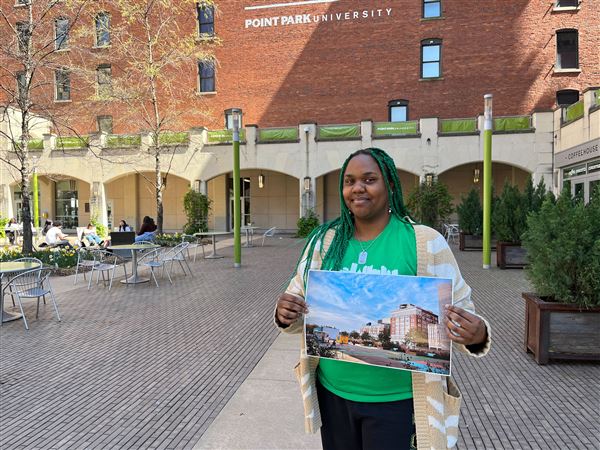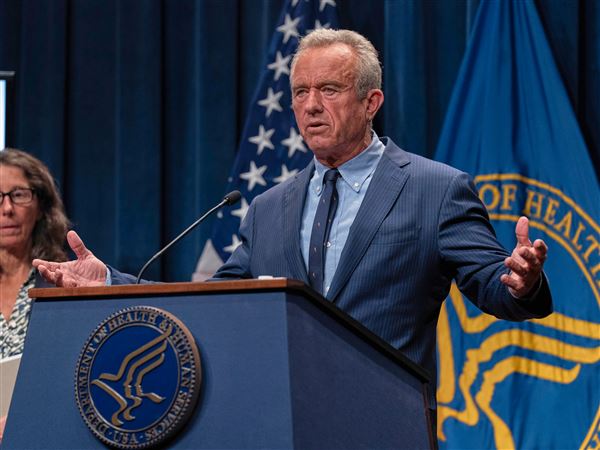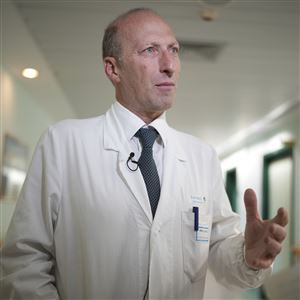The story of Mark D. Lay is a story of unusual choices and unusual results: an athlete choosing to major in economics, a rising Wall Street player choosing to relocate to his native Aliquippa, a conservative money manager choosing to stray from staid bonds to bet big on interest rates.
It is that latter choice that has ensnared the Downtown money manager and his firm, MDL Capital Management Inc., in a whirlwind of bad publicity. A rate-sensitive hedge fund it managed for a state agency in Ohio lost $215 million last year, almost two-thirds of the $355 million it oversaw for the state. Ohio has since sued Lay, and several clients have since bolted.
Through it all, friends of Lay have come to his defense, saying he is being unfairly tarnished by a scandal at an Ohio agency, the Bureau of Workers' Compensation, that was not of his doing, and by an investment strategy that was not all that unusual. The courts, of course, will decide if Lay did anything wrong.
But it is in the court of public opinion where the future of Lay's firm will be determined. Perception as much as performance often determine where public agencies deposit their various pension funds, and for the 41-year-old father of two, a former Quips basketball star who has seen his son become the same, the perception isn't so good these days.

Lay grew up in what he describes as a "lower middle-class" home -- his father, Charles, was a steelworker at Jones & Laughlin's sprawling Aliquippa Works along the shores of the Ohio River. His mother, Annice, was a secretary at Aliquippa High School.
In a small town of sports enthusiasts, Lay's performance on the basketball courts made him something of a celebrity well before his graduation in 1981. James McNie, who coached basketball at Aliquippa, recalled Lay as "one of the smartest players I ever coached. He understood the game very well."
Lay entered Columbia University in the fall of 1981 as an engineering major, treading in the path laid by his older brother, Charles Jr. But then he met Columbia alum Gedale D. Horowitz, who at the time was managing director at Salomon Brothers, one of Wall Street's leading investment firms.
Horowitz introduced Lay to the world of finance, and he was hooked. "I was absolutely fascinated." Lay said. "I had no idea what real wealth was."
He decided to enter the world of high finance, changing his major to economics, and continued to play basketball as a forward on Columbia's team.
He was named team captain his senior year, when he led the Lions to a 9-5, second-place finish in the Ivy League and 13-13 record overall.
During the summers, he interned at Salomon, where Horowitz taught the young athlete the rules of a different kind of game -- the money game -- and introduced him to the players in the financial arena.
When Lay graduated in 1985, he turned down an offer from Horowitz and became a foreign currency trader at Citicorp Investment Bank instead. That same summer, in August, he married his high school sweetheart, Toni McCoy, and settled in New York to begin their family.
Within three years, Lay became a vice president of foreign exchange trading at Citicorp, completing what many might consider an ideal picture of success.
But there was a nagging problem. "New York City was not the place to raise kids," Lay said.
He and his wife decided to return with their two toddlers, a boy and girl, to Aliquippa in 1988.
Lay did a short stint at Mellon Bank as a foreign currency trader before taking a similar position at Pittsburgh National Bank, staying there for a year before moving to the Pittsburgh office of Dean Witter Reynolds.
At Dean Witter, he stepped out of foreign exchange trading to become an account executive.
"It was the other side of the equation" in finance, Lay said. While foreign currency trading had given him a global perspective on economics, working as an account executive would give him experience in selling.
"That's what I wanted to learn, the sales side of the business," he said. After three years, he moved to the Downtown office of Los Angeles-based Cartwright and Walker Securities Inc., again working as an account executive.
But Lay wanted to run his own company, so in January 1993, he and founding partner Tracey M. Gist established MDL Capital with little more than a growing knowledge of markets and a burning desire to succeed.
"We started from day one with no assets. I tried to use any connections I could" to build business, Lay said.
Connections were critical to getting started and would grow in importance as the firm acted to get in the door of various government agencies, making political contributions and emphasizing its minority-owned status. In his May 1997 introductory letter to the Ohio bureau, for example, Lay emphasized that his firm was minority-owned. The bureau had decided a few months earlier to reserve a percentage of contracts for minority-owned firms.
Among Lay's first clients at MDL Capital were the city of Aliquippa, the University of Pittsburgh and the Pennsylvania AFL-CIO. Before long, the firm had $16 million under management -- enough for Lay and Gist to hone their style as money managers.
Even though Lay's prior experience was primarily in trading foreign currencies, the firm focused on bonds. Considered a rather boring field, history shows it can be fraught with risk. Lay says he chose bonds over the more volatile currency markets because he had developed a fundamentally conservative approach to investing, one of "not trying to make a lot of money for clients but trying not to lose money."
As often happens with young companies, MDL Capital's growth was marked by key events that vaulted it forward.
In 1994, it merged with another minority-owned firm, Philadelphia-based Advent Capital Management Partners. The merger brought Advent executive Steven Sanders on board as president and chief executive officer -- Lay remained chairman and Gist treasurer -- and gave MDL Capital offices in Philadelphia and New York.
Three years later, it created a pair of mutual funds for its customers -- MDL Large-Cap Equity Growth fund and MDL Broad Market Fixed Income fund. The funds received a boost in 1999 when Fidelity Investments agreed to list them in their Fidelity Funds Network, a type of supermarket for mutual funds.
An even bigger boost for the company came later that same year when Boeing went shopping for fund managers. Following mergers with Rockwell International and McDonnell Douglas Corp., the aircraft giant wanted to change its investment mix and, under pressure from the Rev. Jesse Jackson's Rainbow/PUSH Coalition, wanted to put more pension money into the hands of minority-owned firms.
Boeing joined MDL Capital's client roster with an allocation of $200 million, followed by a pension fund allocation of $40 million from Sprint, also at the prodding of the Rainbow/PUSH Coalition's Wall Street Project, making 1999 a breakthrough year for the company.
By year-end, MDL Capital was managing $1.5 billion in assets, surpassing Lay's original dream of managing $1 billion and landing it on Black Enterprise's list of top 10 minority-owned asset management firms in the country.
A year later, Jackson's group also talked defense contractor Raytheon into dividing approximately $800 million in pension funds between three minority-owned firms, including MDL Capital.
"The Wall Street Project has been successful at opening doors not only for its specific members, but for the investment money management community in general," Lay told Black Enterprise magazine in 2000. "Raytheon gives us the ability to go to other corporations globally and say, 'Look, we have competed successfully for the business, and we are one of the top fixed-income managers that they have.' "
MDL Capital continued to grow, reaching a pinnacle of $4.43 billion in assets under management in 2002, helped by additional allotments from Boeing and Sprint of $300 million and $50 million, respectively.
But it has been slipping since: Raytheon confirmed last week that it dismissed MDL Capital about two years ago because of poor returns, and both Boeing and Sprint say they no longer entrust their pension funds to the company.
At last count, MDL Capital had $2.78 billion under its belt. That was in February, well before the latest exodus brought on by the revelations of the losses in Ohio.
Lay's New York attorney, Barry Slotnick, of the Pittsburgh-based law firm Buchanan Ingersoll, does not dispute that several clients have left because of the bad publicity. But he also said many are staying because of MDL Capital's results and because they "hold Mark D. Lay in great esteem.''
Lay has landed clients because of merit and results, Slotnick contends, not because he is a minority money manager. "This was not a matter of color," Slotnick said. "It was a matter of confidence.''

MDL Capital may deal in high finance, but its corporate culture is anything but buttoned-down and ostentatious.
In an interview at the company's Downtown headquarters in December, Lay wore a colorful sweater and blue jeans and carried an air of easygoing affability. In a tour of the offices, there was scarcely a suit or tie to be found.
Clothes may make the man, but employee ability makes the company, so Lay is willing to forgo the corporate look. "The talent goes up and down the elevator every day," he said. "It's always a priority to see that our existing employees are happy and that we keep them."
Speaking more generally about his personal priorities, Lay ticked them off like items on a to-do list: "God, family and then work."
His office provided hints of his commitment to family: photographs, school memorabilia and an updated letter from US Airways thanking him for flying 176,000 miles with them in the past year -- an average of 3,500 miles per week.
The high mileage, he explained, resulted from his decision that no matter where his business took him, he would be present for his children's important moments -- even if it meant interrupting a visit to New York or Los Angeles to return to Aliquippa for a school event, then flying back out.
"I won't miss one of their games," he said. "You do what you have to do."
Lay demonstrated a similar level of commitment when his children were in elementary school, according to Midland school district superintendent Nick Trombetta, who was principal of Aliquippa Elementary at the time.
"You didn't see a lot of dads (at the school), and he was one of the few," Trombetta said. "He was very committed to the school, a very involved dad."
Lay has been equally involved in a local church -- Tried Stone Baptist in Aliquippa -- and by raising his children to do the same -- "No Sunday School, no sports."
But he also keeps an open Bible on his desk at work and consults it as part of his decision-making. Faith leads him beyond the church's walls, Lay said..
"Part of my responsibility to God is to give back to the community," he said.
For Lay, that translates into membership on the boards of nonprofit organizations ranging from the Manchester Youth Development Center to the Negro Educational Emergency Drive.
It also means giving young people the opportunity to work as interns at MDL Capital, providing them with the type of experience that Gedale Horowitz provided for him more than 20 years ago.
This summer's intern, though, will likely learn some lessons that those in past years never faced: How to conduct yourself if your are sued and under siege.
First Published: June 26, 2005, 4:00 a.m.















